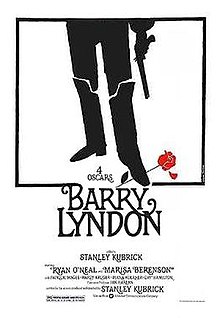| Barry Lyndon | |
|---|---|
 Theatrical release poster by Jouineau Bourduge | |
| Directed by | Stanley Kubrick |
| Screenplay by | Stanley Kubrick |
| Based on | The Luck of Barry Lyndon 1844 story in Fraser's Magazine by William Makepeace Thackeray |
| Produced by | Stanley Kubrick |
| Starring | |
| Narrated by | Michael Hordern |
| Cinematography | John Alcott |
| Edited by | Tony Lawson |
Production companies |
|
| Distributed by |
|
Release dates |
|
Running time | 185 minutes[1] |
| Countries |
|
| Language | English |
| Budget | $11 million[2] |
| Box office | $31.5 million[2] |
Barry Lyndon is a 1975 epic historical drama film written, directed, and produced by Stanley Kubrick, based on the 1844 novel The Luck of Barry Lyndon by William Makepeace Thackeray.[3] Narrated by Michael Hordern, and starring Ryan O'Neal, Marisa Berenson, Patrick Magee, Leonard Rossiter and Hardy Krüger, the film recounts the early exploits and later unravelling of an 18th-century Anglo-Irish rogue and golddigger who marries a rich widow to climb the social ladder and assume her late husband's aristocratic position.
Kubrick began production on Barry Lyndon after his 1971 film A Clockwork Orange. He had originally intended to direct a biopic on Napoleon, but lost his financing because of the commercial failure of the similar 1970 Dino De Laurentiis-produced Waterloo. Kubrick eventually directed Barry Lyndon, set partially during the Seven Years' War, utilising his research from the Napoleon project. Filming began in December 1973 and lasted roughly eight months, taking place in England, Ireland, and Germany.
The film's cinematography has been described as ground-breaking. Especially notable are the long double shots, usually ended with a slow backwards zoom, the scenes shot entirely in candlelight, and the settings based on William Hogarth paintings. The exteriors were filmed on location in England, Ireland, and Germany, with the interiors shot mainly in London.[4] The production had problems related to logistics, weather,[4] and politics (Kubrick feared that he might be an IRA hostage target).[5][6]
Barry Lyndon received seven nominations at the 48th Academy Awards, including Best Picture, winning four for Best Scoring: Original Song Score and Adaptation or Scoring: Adaptation, Best Cinematography, Best Art Direction, and Best Costume Design. Although some critics took issue with the film's slow pace and restrained emotion, its reputation, like that of many of Kubrick's works, has grown over time. In the 2022 Sight & Sound Greatest Films of All Time poll, Barry Lyndon placed 12th in the directors' poll and 45th in the critics' poll.
- ^ a b "Barry Lyndon (A)". British Board of Film Classification. 26 November 1975. Archived from the original on 27 February 2022. Retrieved 26 February 2022.
- ^ a b "Barry Lyndon". IMDb. 18 December 1975.
- ^ "Barry Lyndon". British Film Institute Collections Search. Retrieved 21 August 2024.
- ^ a b "Marisa Berenson on the making of Barry Lyndon: Kubrick wasn't a 'difficult ogre – he was a perfectionist'". The Independent. 13 July 2016. Archived from the original on 20 August 2016. Retrieved 20 June 2020.
- ^ Cite error: The named reference
Whitingtonwas invoked but never defined (see the help page). - ^ Cite error: The named reference
rtewas invoked but never defined (see the help page).